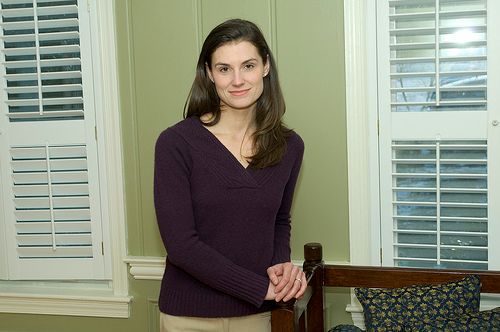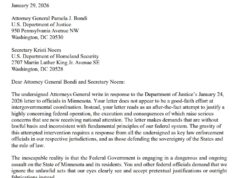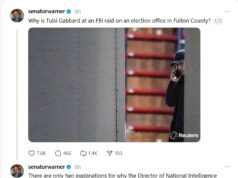 Krystal Ball is dead wrong on the issue at the center of American strategic security interests. Her naïve, casual, pragmatic responses to complex questions and nervous laughter when she was being taken to task by her interviewer today made clear that she is neither ready for prime time nor Congress.
Krystal Ball is dead wrong on the issue at the center of American strategic security interests. Her naïve, casual, pragmatic responses to complex questions and nervous laughter when she was being taken to task by her interviewer today made clear that she is neither ready for prime time nor Congress.
None of this makes Rob Wittman more qualified for office, mind you. But if Krystal Ball believes what she expressed in her discussion on the Tony Macrini show this morning, there is no compelling reason for progressives to think more than to vote for her on election day. She doesn’t even list the war as an issue on her website. Shoe leather and money are better directed to a Tom Perriello who can think on his own and explain to his constituency why his positions are in their and the nation’s interests.
Macrini went to the conflict in Southwest Asia in short order reasoning that people in Hampton Roads are more likely to be somehow directly affected than people who live in Idaho or elsewhere. He turned the discussion over to Ball after wondering aloud that, here we are with 4,500 Americans dead and $1 trillion spent, if the wars were a good idea. Most of the discussion of that issue follows.
Ball: I do not think that Iraq was the place that we should have been. I think that Afghanistan was a war that made sense given our objectives. But I don’t think that Iraq was a place that we should have gone into. Now all that being said, it seems that all is going well on the ground. And I think there was a time that people were thinking about the war in Iraq the way that they are starting to feel about the war in Afghanistan, you know: is there something we can do? Is there a way we can get to success? And General Patreaus successfully architected the surge and I think that is on large part responsible for the way we are able to be in this place of relative stability now.”
Macrini: It was a very different situation, you did have for years a central government in Iraq, you did have a literate population, and you did have much more western influence, you had much more religious tolerance, you had much more equality of the sexes. In that part of the world, Afghanistan, it’s completely different.
Ball: Yeah, and I’m not saying they are the same at all. I’m just saying that General Patreaus is incredibly smart. And I’m hopeful that if anyone can get that job done, he’s the one that can do it.
Macrini: Are you for whatever it is we are trying to do now? And tell me, what is it that we are trying to do?
Ball: I think what we are trying to do now is not repeat the mistakes of the past. Part of the reason we ended up with the Taliban in control and with the ugly situation harboring terrorists in Afghanistan that we had is the fact that after the Soviets left Afghanistan and we lost interest, we completely lost interest. We withdrew any sort of aid, we withdrew any sort of presence, and in that space, that’s when the Taliban came to power. That’s when we had extremists coming in and that’s when we had al Qaida coming in and having safe haven. I think that if we leave now, I think we are in danger of a very similar thing happening.
Macrini: If we leave now what will happen?
Ball: If we leave now we have another destabilized region that is prime area for terrorists to train and have a safe haven.
Macrini: Can the terrorists train in Iran?
Ball: I don’t know the answer to that question.
Macrini: Can they train in Somalia?
Ball: Sure, yes. There are other destabilized regions.
Macrini: So, do we occupy them all? If that’s your premise, that if an area can be easily destabilized and a breeding ground for terrorists, we should occupy them. So we need to bring back the draft. We need to occupy Iran, we need to occupy Libya, maybe even South America, what do you think?
Ball: I don’t think that’s the case at all. But this is directly related to the attacks on 9/11. There was a direct relationship and we are there now. And, I think, you know, we have a chance to bring some stability to this region and to make sure that it’s not the Taliban in charge. I think we have a real opportunity in Afghanistan right now.
Macrini: Can we do it completely on our own?
Ball: I think we can do it on our own. I mean we would certainly love to have help. But we have…
Macrini: When I say on our own, I mean the Taliban, we have seen the reports if they are to be believed, those 90,000 memos from the Pentagon with this Wikileaks and they are saying, okay, Pakistani intelligence authorities are working against us. We know that Karzai is a criminal; we’re propping up a criminal; his brother is one of the biggest drug dealers in the world; I am asking you, can we succeed without some legitimate government in Pakistan that is truly backing us and without Karzai? Do we need these people to come in on our side for us to succeed, do you think?
Ball: That’s a more challenging question. We do need Pakistan to be on our side and these Wikileaks were just confirming suspicions we’ve had for a long time that Pakistan has not been entirely our ally in this war. I think we also do need some sort of stable government in Afghanistan to be a partner. I have not given up on either of those things happening.
Beyond pulling the 9/11 card, she tried to explain what we are doing by outlining what we aren’t doing. You’d have thought it was Sarah Palin speaking if you happened to dial in at that moment. She seemed unaware that General Patreaus has been the Commander of CENTCOM all this time and had the opportunity to influence whatever she thinks he is going to do differently and never did. But he’s “incredibly smart.” And she thinks we can do it on our own, without regional cooperation and make it last longer than we can stay. She is hopeful that everyone will play along because:
Ball: I think that Pakistan would want to side with us because we are a very important player in the world.
Macrini: We bribe them; we give them money. We bribe them.
Ball: We provide them with aid and we provide them with stability, and we provide them with legitimacy as our partner in the world.
Macrini: There’s an argument, and you are a Virginian, you’re born and raised in Virginia and we look at our own Civil War in American history. Well, Virginia wasn’t a state that seceded because of slavery. Most of the southern states did. They wrote that down. That had a lot to do with why they seceded. In Virginia, you have the Union say, we need you to raise a big army, about 75,000 men and we are going to go through Virginia to attack South Carolina. And that is when the Virginians fought. Now, using that as a parallel, do you think that having an army in Mesopotamia, now Iraq, and you have a huge army in Afghanistan actually has the opposite effect from what we want? Does this possibility exist in your mind? That what we are actually accomplishing is firing them up, adding more terrorists and making a better argument for al Qaida to exist?
Ball: I think certainly in Iraq, at first since we were very badly bungling that war and the occupation there I think that was a legitimate argument. I would say that in Afghanistan, these are people who ultimately just want simple things: they want security, they want food, they want to be able to send their kids to school just like we do. And…
Macrini: … and they want the Crusaders out of their country.
Ball: They want safety and they want security and to the extent that we can help provide that and to the extent that we can provide better functioning infrastructure I think that’s something that’s a case in our favor.
Macrini: There isn’t any…you could not put a piece of paper between you and Rob Wittman on this, what I think is the most important issue. …. What about people who think they have no choice at all between the two parties? That really it’s just two different wings on the same bird? That when it comes right down to it, the all important issue, I cannot find you disagreeing with him one bit on this issue.
Ball: On this particular issue I suspect that myself and Rob Wittman are very much on the same page actually…But there are a lot of other issues.
So there you have it. A candidate whose world view is so narrowly shaped that she thinks “these are people who ultimately just want simple things…just like we do (emphasis added).” And if we just impose our values on them, everything will be just fine. An exchange early in the interview that was interesting:
“Both of them, I’d say, are very representative, sort of the typical informed American voter. They pay attention, they vote on candidates. They vote on what issues they think are important at that time. And that’s for me been very grounding because they can be my touchstones. I ask them what do they think about a particular issue and where their headspace is and that’s been very helpful to me.” – Ball commenting on her parents’ political interests
The apple does not fall far from the tree. The hint of riding the consensus provides a clue to how this candidate is shaped by perceptions. It shows that she is unwilling to swim against the tide; willing to go with the flow. And the flow at this moment is conveniently pro-Afghanistan War in both parties and certainly in 1st District. But that too shall pass.
By the way, she should be challenged to substantiate her claim that her anti-Iraq/pro-Afghanistan stance has always been her position. Or at least explain when “always” was.


![[UPDATED 1/29/26] Audio: Sen. Tim Kaine Talks to Blue Virginia About His “Five-Point Plan” to Fight Trump’s Orban-Like Assault on US Democracy; Civil Disobedience a la MLK Jr.; Trump’s Bogus “Energy Emergency”; the Crucial Importance of the 2025 VA Elections; etc.](https://bluevirginia.us/wp-content/uploads/2025/02/kaineinterview2-238x178.jpg)






![[UPDATED 1/29/26] Audio: Sen. Tim Kaine Talks to Blue Virginia About His “Five-Point Plan” to Fight Trump’s Orban-Like Assault on US Democracy; Civil Disobedience a la MLK Jr.; Trump’s Bogus “Energy Emergency”; the Crucial Importance of the 2025 VA Elections; etc.](https://bluevirginia.us/wp-content/uploads/2025/02/kaineinterview2-100x75.jpg)

